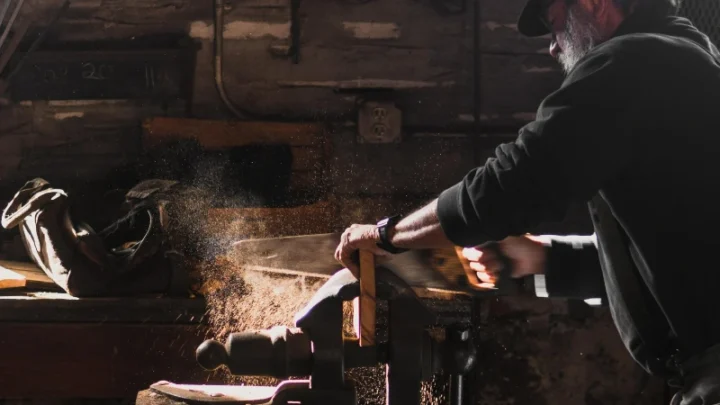Disclosure: This post may contain affiliate links, meaning we get a commission if you decide to make a purchase through our links, at no cost to you. Please read our disclosure for more info.
You aren’t the only person in the world to emerge from the pandemic years with an expensive new hobby. While others might have become world-class bread makers or Insta-famous interior designers, you opted for an old-world skill that requires a specialized space filled with expensive tools: woodworking.
There is an unexplainable joy that comes with working with wood. Enduring hour after hour of sanding provides a clarity and self-confidence that few can understand. After assembling your first few furniture pieces, you are ready to commit to purchasing a few larger and costlier tools to facilitate bigger and better builds — but you need to do it on a budget.
Here are a few tips for acquiring the tools you need in a working woodshop without wasting any money:
In This Post:
Prioritize Foundational Woodshop Pieces
Your woodworking experience over the past couple years has shown that you don’t need every enormous tool to produce impressive pieces. If you don’t have much room for your woodshop, you can make do with just a few of the most useful woodworking tools. Sticking to the essentials is a good way to avoid going over budget while you are putting your woodshop together because you can be relatively certain that you will make good use of every tool you acquire. Then, as you gain more woodworking experience, you can better identify additional tools you need and want.
The foundational tools you must have in your shop include:
- Miter saw
- Circular saw
- Jig saw
- Router
- Random orbital sander
- Drill and driver set
- Nail gun
- Pocket hole system
- Pipe and bar clamps
Some of these items can be upgraded to larger and more permanent tools; for example, you will almost definitely find a table saw easier to use than a circular saw. Depending on your space, your budget and your experience, you can opt for the larger tools as you set up your shop or later down the line.
Identify High-quality Budget Tool Brands
Some woodworking brands are better than others. For example, Baileigh machines are well-known around the world for their precision, durability and sleek appearance. However, a reputation for excellence often comes with a high price tag, and when you are just starting in woodworking, you might not appreciate the advantages that come with the highest quality of tools.
Instead, as you gain more knowledge and skill, you should be plenty happy with low-budget brands with high ratings and positive reviews. Some of the best power tool brands for budget woodworkers include:
- Ryobi
- Jet
- Black+Decker
Shop During the Year’s Biggest Sales
Patience is among the woodworker’s most well-honed skills, as crafting items from wood often requires a significant amount of persistence. You should use your supply of patience to wait to buy the larger and more expensive tools for you shop until some of the year’s biggest sales roll around. In particular, you can find excellent Black Friday deals from home improvement retailers and woodworking specialty stores. Other holidays that often feature impressive discounts on tools are Presidents’ Day and Father’s Day.
Find Secondhand Tools From Older Woodworkers
Older generations had more time, more incentive, more money and more interest in cultivating craftsman skills like woodworking than many members of younger generations. Many of the most experienced woodworkers are aging out of their ability to utilize their tools, but fortunately, most woodworkers would rather see their tools put to good use in someone else’s woodshop than see those tools rust and rot.
There are many ways you can connect with older woodworkers and gain access to their high-quality tools. You might join a local woodworking group, found through hobby magazines like FineWoodworking. If you notice woodworkers around your neighborhood, you can reach out to get to know them. In both of these cases, friendly members of your woodworking community are likely to allow you access to their shops or perhaps lend you less common tools you might need for specific projects.
If you want to acquire secondhand tools of your own, you may be able to find excellent deals through marketplaces like Offerup, Craigslist and Facebook. You might also dedicate some free time to perusing offerings at estate sales in your area, which you can find through EstateSales.net.
A woodshop filled with the tools you need is all that stands between you and your next big woodworking project. With patience and savvy, you can assemble a functional woodshop that will serve you well for the rest of your life.

